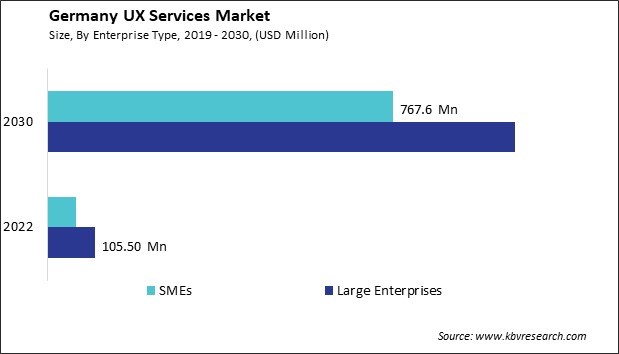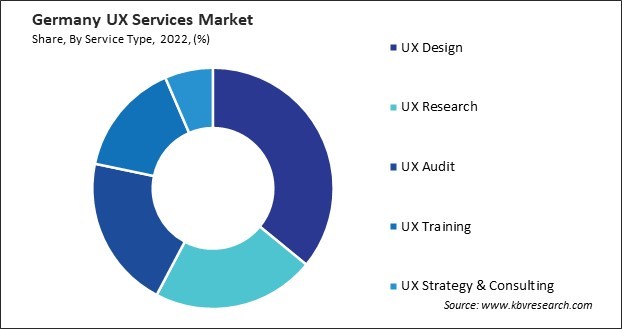Germany UX Services Market Size, Share & Trends Analysis Report By Enterprise Type (Large Enterprises, and SMEs), By Service Type (UX Design, UX Research, UX Audit, UX Training, and UX Strategy & Consulting), and Forecast, 2023 - 2031
Published Date : 22-Apr-2024 |
Pages: 57 |
Formats: PDF |
COVID-19 Impact on the Germany UX Services Market
The Germany UX Services Market size is expected to reach $1.8 Billion by 2030, rising at a market growth of 35.1% CAGR during the forecast period.
The UX services market in Germany has experienced significant growth and transformation in recent years, driven by the increasing emphasis on digitalization. The e-commerce sector in Germany has particularly seen a surge in demand for UX services, with businesses aiming to optimize their online platforms for a more satisfying customer journey. The emphasis on mobile responsiveness and intuitive navigation has become paramount as consumers increasingly rely on smartphones and tablets for online activities.

Furthermore, the COVID-19 pandemic has accelerated the digital transformation in traditional sectors such as education and manufacturing. Educational institutions in Germany have increasingly adopted online learning platforms, necessitating a focus on user-friendly interfaces for students and educators alike. In the manufacturing sector, Industry 4.0 initiatives have led to the integration of digital technologies, requiring UX services market to enhance the usability of complex industrial interfaces.
The gaming industry in Germany has also witnessed a surge in demand for UX services, driven by the growing popularity of online and mobile gaming. As gaming experiences become more sophisticated and immersive, UX design plays a crucial role in ensuring that games are entertaining, easy to navigate, and enjoyable for a diverse audience.
Market Trends
Adoption of technology in healthcare
The adoption of technology in healthcare is witnessing a significant surge in Germany, with a particular focus on enhancing the UX services market. In recent years, the German healthcare sector has prioritized the integration of cutting-edge technologies to optimize user experiences for healthcare providers and patients. Implementing electronic health records (EHRs) has been pivotal, allowing for seamless data management and sharing among healthcare professionals. This has not only improved the accuracy and accessibility of patient information but has also contributed to more personalized and efficient healthcare services.
According to the International Trade Administration, in 2022, the healthcare industry in Germany contributed significantly to the country's economy, with a gross value of EUR 439.6 billion, constituting 12.7% of the total gross value added. This underscores the industry's substantial role in the economic landscape. Technology integration in healthcare, particularly in the UX services market, has been pivotal in shaping and enhancing the sector's efficiency and services.
Telemedicine has gained remarkable traction in Germany, especially after global events underscoring the importance of remote healthcare services. Adopting telehealth platforms and mobile health applications has provided patients with convenient access to medical consultations and health monitoring, enhancing the overall user experience. In the realm of diagnostics, the integration of artificial intelligence (AI) has played a crucial role. AI-driven diagnostic tools have proven invaluable in analyzing medical imaging, pathology slides, and genetic data, leading to faster and more accurate diagnoses. This technological leap has not only improved patient outcomes but has also positively impacted the efficiency of healthcare delivery in Germany.
The UX services market in Germany has responded to these technological advancements by focusing on user-centric design principles. User interfaces for healthcare applications and platforms are being developed with a keen understanding of the unique needs of healthcare professionals and patients, ensuring a smooth and intuitive experience. Thus, Germany's healthcare sector is experiencing a transformative shift through the widespread adoption of technology, particularly in the UX services market.
Growing adoption of UX services in small and medium-sized enterprises
In recent years, there has been a noteworthy surge in the adoption of UX services among small and medium-sized enterprises (SMEs) in Germany. German SMEs, known for their resilience and adaptability, are realizing UX's pivotal role in gaining a competitive edge in the digital landscape. As German consumer expectations evolve, these enterprises are acknowledging the importance of investing in UX services to enhance the overall usability and accessibility of their digital products and services.
One of the key drivers of this growing adoption is the digital transformation sweeping across various industries in Germany. SMEs are leveraging technology to streamline their operations and expand their industry reach. As they undergo this transformation, the emphasis on delivering a positive user experience has become paramount. Whether it's a B2B platform or a consumer-facing application, businesses understand that a well-designed and intuitive interface is crucial for customer engagement and loyalty.
The German UX services market has responded to this demand by witnessing a proliferation of specialized agencies and consultants catering specifically to the needs of SMEs. These service providers offer tailored solutions that align with smaller businesses' unique requirements and constraints, making UX services more accessible and feasible for this segment. Hence, the surge in the adoption of UX services by SMEs in Germany reflects a strategic shift towards prioritizing user-centric design as an integral part of business strategy. As digital competition intensifies, investing in a superior user experience has become a crucial differentiator for SMEs aiming to thrive in the dynamic German business landscape.

Competition Analysis
The UX services market in Germany is dynamic and competitive, reflecting the country's commitment to innovation and technology. As a powerhouse in the European Union, Germany hosts many companies offering specialized UX services to cater to the growing demand for seamless and user-friendly digital experiences. One prominent German UX services market player is SAP, a global leader in enterprise software solutions. SAP's UX design services focus on creating intuitive and efficient interfaces for their enterprise software, ensuring users can easily navigate complex systems. With a strong emphasis on user research and testing, SAP's UX services align with Germany's reputation for precision and efficiency.
Another key player is Namics, a digital agency with a strong presence in Germany. Namics specializes in creating compelling digital experiences through a user-centric approach. Their services include UX strategy, interface design, and usability testing. By tailoring their solutions to the German industry, Namics addresses local users' unique preferences and behaviors.
ICON Worldwide, headquartered in Switzerland with a significant presence in Germany, is an international digital agency known for its UX/UI design expertise. The company's designers and developers collaborate closely with clients to deliver visually appealing and user-friendly solutions. Their focus on understanding the German user's cultural nuances sets them apart in the industry.
In the realm of e-commerce, Shopware, a German-based company, offers a comprehensive e-commerce platform with a strong emphasis on UX. Their services include customizable storefronts, intuitive navigation, and mobile responsiveness, catering to the evolving expectations of German online shoppers. Shopware's localized approach ensures businesses can create digital storefronts that resonate with the German audience.
Moccu, a Berlin-based digital agency, specializes in crafting immersive digital experiences through innovative UX design. Their portfolio includes projects for prominent German brands, showcasing their ability to understand and cater to the specific needs of the local industry. Moccu's commitment to creativity and functionality aligns with the German preference for sophisticated design.
The German UX services market includes smaller boutique agencies such as UseTree and UID. UseTree, based in Hamburg, specializes in UX consulting and design thinking workshops, offering tailored solutions to businesses seeking to enhance their digital presence. UID, located in Ludwigsburg, focuses on user-centered design, providing services that range from user research to interface design. Hence, the UX services market in Germany is characterized by a diverse array of companies, each contributing to the country's reputation for precision, innovation, and user-centric design.
List of Key Companies Profiled
- Ipsos SA
- UX studio Zártkörűen Működő Részvénytársaság
- Nielsen Norman Group
- Appnovation Technologies Inc.
- AnswerLab LLC
- Bold Insight, Inc.
- McKinsey & Company
- Accenture PLC
- Pricewaterhousecoopers LLP (PwC)
- IBM Corporation
Germany UX Services Market Report Segmentation
By Enterprise Type
- Large Enterprises
- SMEs
By Service Type
- UX Design
- UX Research
- UX Audit
- UX Training
- UX Strategy & Consulting
1.1 Market Definition
1.2 Objectives
1.3 Market Scope
1.4 Segmentation
1.4.1 Germany UX Services Market, by Enterprise Type
1.4.2 Germany UX Services Market, by Service Type
1.5 Methodology for the research
Chapter 2. Market Overview
2.1 Introduction
2.1.1 Overview
2.1.1.1 Market Composition and Scenario
2.2 Key Factors Impacting the Market
2.2.1 Market Drivers
2.2.2 Market Opportunities
2.2.3 Market Restraints
2.2.4 Market Challenges
2.2.1 Market Trends
2.3 Porter Five Forces Analysis
Chapter 3. Germany UX Services Market
3.1 Germany UX Services Market, By Enterprise Type
3.2 Germany UX Services Market, By Service Type
Chapter 4. Company Profiles - Global Leaders
4.1 Ipsos SA
4.1.1 Company Overview
4.1.2 Financial Analysis
4.1.3 Segmental Analysis
4.1.4 Research & Development Expenses
4.1.5 Recent strategies and developments:
4.1.5.1 Acquisition and Mergers:
4.1.5.2 Geographical Expansions:
4.1.6 SWOT Analysis
4.2 UX studio Zártkörűen Működő Részvénytársaság
4.2.1 Company Overview
4.3 Appnovation Technologies Inc.
4.3.1 Company Overview
4.4 Bold Insight, Inc.
4.4.1 Company Overview
4.5 McKinsey & Company
4.5.1 Company Overview
4.6 Accenture PLC
4.6.1 Company Overview
4.6.2 Financial Analysis
4.6.3 Segmental Analysis
4.6.4 Research & Development Expenses
4.6.5 Recent strategies and developments:
4.6.5.1 Acquisition and Mergers:
4.6.6 SWOT Analysis
4.7 Pricewaterhousecoopers LLP (PwC)
4.7.1 Company Overview
4.7.2 Financial Analysis
4.7.3 Segmental and Regional Analysis
4.7.4 Recent strategies and developments:
4.7.4.1 Acquisition and Mergers:
4.7.5 SWOT Analysis
4.8 IBM Corporation
4.8.1 Company Overview
4.8.2 Financial Analysis
4.8.3 Regional & Segmental Analysis
4.8.4 Research & Development Expenses
4.8.5 Recent strategies and developments:
4.8.5.1 Product Launches and Product Expansions:
4.8.6 SWOT Analysis
TABLE 2 Germany UX Services Market, 2023 - 2030, USD Million
TABLE 3 Germany UX Services Market, By Enterprise Type, 2019 - 2022, USD Million
TABLE 4 Germany UX Services Market, By Enterprise Type, 2023 - 2030, USD Million
TABLE 5 Germany UX Services Market, By Service Type, 2019 - 2022, USD Million
TABLE 6 Germany UX Services Market, By Service Type, 2023 - 2030, USD Million
TABLE 7 Key Information – Ipsos SA
TABLE 8 Key Information – UX studio Zártkörűen Működő Részvénytársaság
TABLE 9 Key Information – Appnovation Technologies Inc.
TABLE 10 Key Information – Bold Insight, Inc.
TABLE 11 Key Information – McKinsey & Company
TABLE 12 Key Information – Accenture PLC
TABLE 13 Key Information – Pricewaterhousecoopers LLP
TABLE 14 Key Information – IBM Corporation
List of Figures
FIG 1 Methodology for the research
FIG 2 Germany UX Services Market, 2019 - 2022, USD Million
FIG 3 Key Factors Impacting UX Services Market
FIG 4 Porter’s Five Forces Analysis – UX Services Market
FIG 5 Germany UX Services Market Share, By Enterprise Type, 2022
FIG 6 Germany UX Services Market Share, By Enterprise Type, 2030
FIG 7 Germany UX Services Market, By Enterprise Type, 2019 - 2030, USD Million
FIG 8 Germany UX Services Market Share, By Service Type, 2022
FIG 9 Germany UX Services Market Share, By Service Type, 2030
FIG 10 Germany UX Services Market, By Service Type, 2019 - 2030, USD Million
FIG 11 Recent strategies and developments: Ipsos SA
FIG 12 SWOT Analysis: Ipsos SA
FIG 13 SWOT Analysis: Accenture PLC
FIG 14 SWOT Analysis: Pricewaterhousecoopers LLP (PwC)
FIG 15 SWOT Analysis: IBM Corporation